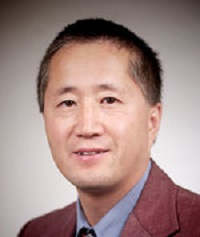
Prof. Peng Shi

Prof.Peng Shi
The University of Adelaide, Adelaide, Australia
IEEE Fellow, IET Fellow, Editor-in-Chief of IEEE Transactions on Cybernetics
Biography:
Peng
Shi received the PhD degree in Electrical Engineering from the University of Newcastle,
Australia, the PhD degree in Mathematics from the University of South Australia, the Doctor
of
Science degree from the University of Glamorgan, UK, and the Doctor of Engineering degree
from
the University of Adelaide, Australia. He is now a Professor at the School of Electrical and
Mechanical Engineering, and the Director of Advanced Unmanned Systems Laboratory, at The
University of Adelaide, Australia. His research interests include systems and control theory
and
applications to autonomous and robotic systems, cyber-physical systems, and multi-agent
systems.
He received the Ramesh Agarwal Life-time Achievement Award in Science, Engineering and
Technology from the International Engineering and Technology Institute in 2023, the MA
Sargent
Medal Award from Engineers Australia in 2022; the honor of Life-time Achiever Leader-Board
and
Field Leader from The AUSTRALIAN Research Review from 2019-2022, and the recognition of a
Highly
Cited Researcher from Thomson Reuters 2014-2022. Currently he serves as the Editor-in-Chief
of
IEEE Transactions on Cybernetics, a Senior Editor of IEEE Access, and an editorial member
for a
number of journals, including Automatica and IEEE Transactions on (Artificial Intelligence,
and
Circuits and Systems). His professional services also include as the President of the
International Academy for Systems and Cybernetic Sciences, the Vice President of IEEE SMC
Society, and IEEE SMC Society Distinguished Lecturer. He is a Fellow of IEEE, IET, IEAust
and
CAA, and a Member of the Academy of Europe.
Speech
Title: Consensus and Formation Control for Multi-agent Systems
Abstract: The
key features of Multi-agent Systems (MAS) are communication, coordination, and
collaboration, by which the agents can achieve a common (and possibly difficult) goal in a
more
effective and efficient way. Three main topics within the realm of MAS are consensus,
flocking
and formation control. Cooperating processes often require agents to reach a consensus,
which is
the fundamental problem in MAS. Flocking (or swarming) is a self-organizing behavior
originated
from small-size animals with lower intelligence, which enables the emergence of swarm
intelligence to improve the whole system survivability and competitiveness. Formation
control
generally aims to drive the agents to achieve a desired formation, scalable and/or
changeable.
In this talk, modeling analysis and design of a variety of distributed schemes for consensus
and
formation control are introduced. Simulations and experimental examples are provided to
demonstrate the potential of the proposed new design techniques.